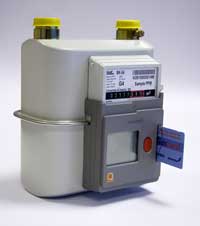
Posted to News on 1st Aug 2007, 18:43
Designers improve price/performance ratio of gas meters
Cambridge Consultants has designed a new pre-payment gas meter that costs one-third less to manufacture and reduces costs relating to operation and maintenance.

Cambridge Consultants is playing a key role in a project designed to improve the economics of the national Quantum gas pre-payment scheme, which currently serves almost one in six gas users in the UK.
Cambridge Consultants has developed a new generation gas meter to meet aggressive price/performance targets set by Quantum scheme operator Siemens Energy Services. The design substantially lowers the meter's cost of construction, and incorporates many new features to simplify the back-office procedures associated with managing accounts. Together, these cost-saving measures could help to lower tariffs for the UK's 2.3million pre-payment gas customers.
Commenting on the significance of the new design, Matt Hamblin of Siemens Energy Services says: "The rental costs of the smartcard-based gas meters used to manage the pre-payment process represent over half of the total 'cost to serve' the consumer, and economies here have a big impact on the bottom line. A lot of the original pre-payment meters are due for replacement in the next few years, and we commissioned this new meter design to allow the Quantum scheme to run more efficiently and cost-effectively."
Skills and experience
The new meter, which is now in production, is called Q-Smart. Cambridge Consultants won the design contract on the strength of its ability to offer the complete range of electronic, software, power management, mechanical and industrial design skills, and for its extensive meter design know-how that dates back to projects in the 1980s.
Cambridge Consultants' Martin Cooper, who led the product development project, says: "The broad set of skills that we brought to bear on this project allowed us to rethink the design and make major reductions in build cost, while simultaneously improving performance. We have eliminated parts, re-worked functions so that they can be performed by lower-cost components or software, and generally optimised the meter for high-volume manufacture, in order to meet the project's aggressive price/performance target."
Q-Smart reduces meter construction costs by around one-third. Much of the cost reduction stems from the design of the meter's electronic control circuitry, which is simpler than that used in existing Quantum meters. The circuitry has fewer components and requires only one major IC - a standard 16-bit microcontroller. This mounts on one low-cost single-sided PCB, replacing two used in other meters.
A lot of thought has also been applied to minimising power consumption. The control software ensures that the control circuitry 'sleeps' for the vast majority of time. In conjunction with other power management techniques, this allows the new meter to operate for its entire life from a single cell rather than two.
This circuitry manages the gas valve and flow meter - which is a conventional and low-cost bellows design - plus a man-machine interface with an LCD, pushbutton, and smartcard reader. The much-simplified meter design still meets the requirements of the ATEX (explosive atmospheres) Directive, and includes powerful fail-safe features to protect the consumer.
Service visits designed-out
The meter makes further contributions to cost reduction by eliminating common causes of service visits. Its reduced power consumption provides one major gain, as battery life now exceeds the target life of the meter itself - in excess of 10 years - thereby eliminating battery changes. Simpler mechanical construction has also eradicated some of the meter 'tamper' faults that will currently close the valve and necessitate a service visit.
New facilities incorporated in the software eliminate further common causes of visits, such as a change in tenancy or gas supplier. Other new features include extensions in the command set that allow the Quantum processing centre to send messages to individual meters via the consumer's smartcard. Among these is a 'suspended disconnect' facility that allows the energy supplier to postpone valve closure during holiday periods when it might be difficult to recharge the smartcard, or overnight when a service visit would be more expensive.
Matt Hamblin comments: "At the outset of this project, we set a very difficult target for cost reduction. Cambridge Consultants' product design know-how has risen to this challenge, giving us a meter design that we believe has the potential to help make this sector much more competitive, and much more open - providing more flexible payment mechanisms for all gas consumers.
Want the latest machine building news straight to your inbox? Become a MachineBuilding member for free today >>

















